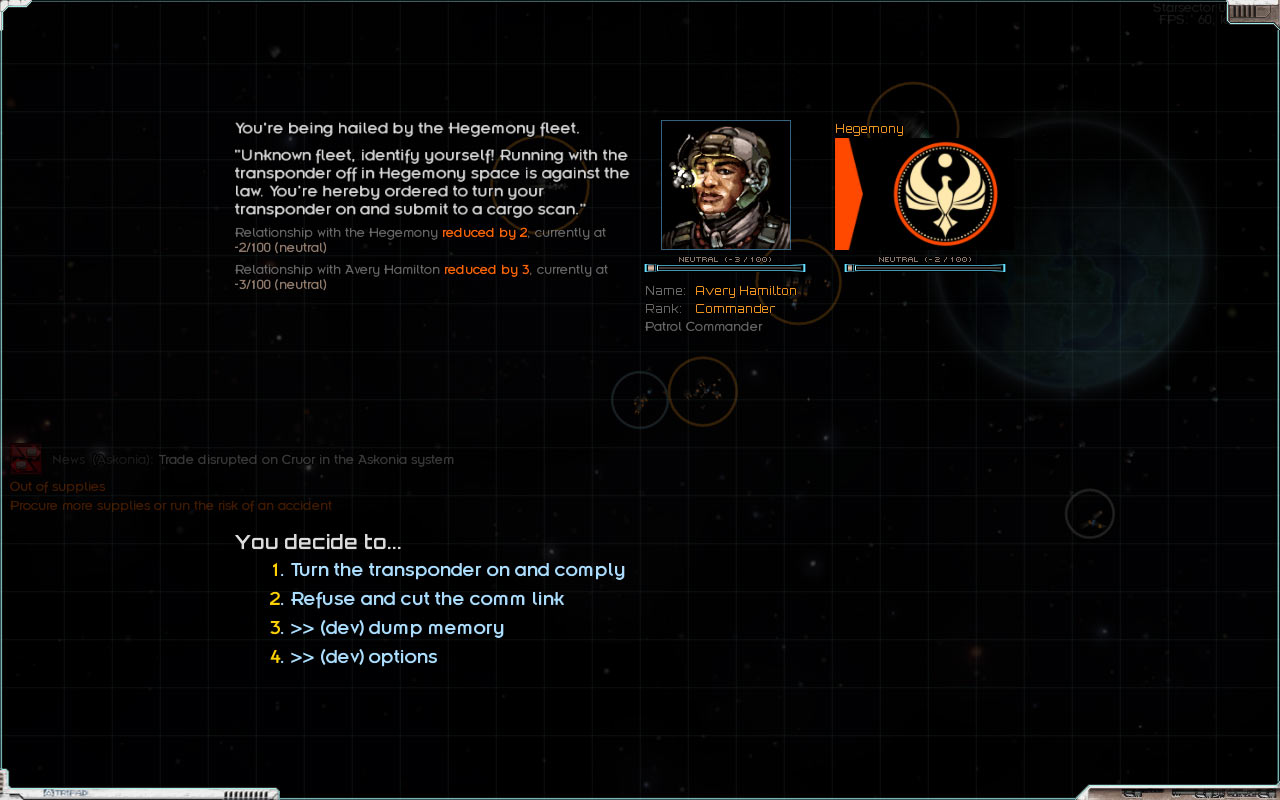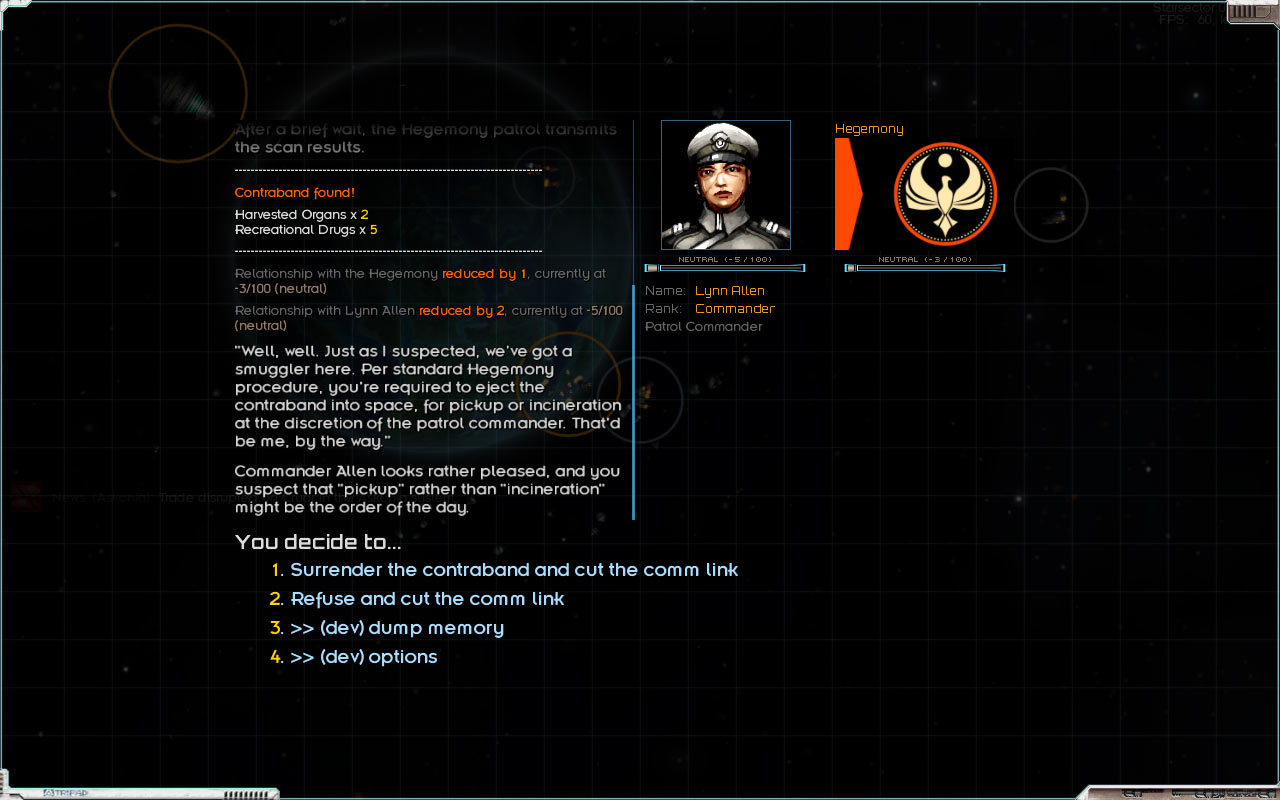Transponder
I’d mentioned transponders in the last couple of posts, mostly in the “here’s roughly what they do, details TBD”. Well, I’ve spent the last week or so working on it, and now it’s time for those details!
A transponder, much like in real life, is a shipboard device that sends out identifying information on a public channel. Smugglers, pirates, and other shady types find some advantages from turning it off, offset by increased attention from patrols. Conceptually, each ship has one, but in terms of game mechanics, it’s controlled on a fleet level. All ships in a fleet either have their transponders on or off.
Because I’m pretty sure someone will bring it up: you could probably squeeze some nuance out of allowing per-ship transponder control. However, I think it’s better to keep individual mechanics as simple as possible and get complexity out of the interactions of different mechanics instead. It’s the same idea as having a few simple rules that work together vs one really complicated rule. In the first case, you have a game. In the second, you have a mess.
Overview
Before diving into the complexities, let’s summarize what the transponder does, mechanically:
Turning the transponder off attracts the attention of patrols, makes you harder to see, reduces the reputation impact of your actions, and allows trade that might not be possible otherwise due to your reputation.
I think it’s interesting to see how something that can be summarized relatively succinctly nonetheless gets very involved in the details. With that in mind, let’s dive into those.
Tactical effects
Having the transponder on makes a fleet detectable at twice the normal range, and gives others full information on it. Having the transponder off only gives others partial information – at first, the fleet is only visible as a “sensor contact”, without detailed information on the composition or what faction it belongs to. At closer range, others see the fleet composition, but not its faction.
What does this mean, in practical terms? If you’re flying with the transponder on, pirates and such are going to see you before you see them, a major tactical disadvantage. On the other hand, if you’ve got it turned off, others won’t know who you are, and may assume the worst – civilians may run away, while patrols will go to check you out, and will be none too happy if they catch you. Pirates may assume you’re one of them, and are less likely to investigate transponder-off sensor contacts.
Trade and smuggling
If you come into market with the transponder on, things work as normal – if the faction is inhospitable or worse towards you, you won’t be able to trade at all.
If you come in with the transponder off, that’s where things get interesting, because you may be able to do business regardless of the market’s faction being hostile towards you.
First of all, if any patrol can see you or is currently chasing you, you still won’t be able to trade. This makes “going dark” to reduce your visibility a decent idea, although you have to do it early enough to avoid being seen in the first place – you can’t just pop it on, lose a pursuing patrol for a split second, and open up the market.
Let’s say you’ve managed to avoid patrols, what then? You’ll be able to trade on the black market, and the impact of this trade on your standing with the factions involved is much-reduced. If you’re smuggling and have high standing, you’ve got an incentive to do it with the transponder off to reduce the reputation hits of black-market trade. If you’re smuggling and your standing is low, you’ve got to turn the transponder off to be able to trade at all.
One nice thing here is there was a rule that said something to the effect of, “you can only sneak into a market if your ship has 3 frigates or less in it”. Very arbitrary, but felt necessary to limit smuggling to smaller fleets, since it has a higher profit margin than regular trade. Now, that rule is gone – instead, existing mechanics take care of it naturally. Larger fleets are easier to detect, and so it’s much harder to avoid the attention of patrols.
Certain factions (independents, pirates) and markets (ones with a “Free Port” condition) allow open trade with the transponder off. This means you have some opportunities to trade with a faction that’s otherwise hostile.
Finally, if you’ve been involved in hostilities (i.e. battles) against the faction anywhere around a market, you won’t be able to sneak in. Having the transponder off is less total anonymity and more plausible deniability; if your actions are all over the local news, you’ll need to wait until things die down. This means that “sneaking in” isn’t a matter of simply destroying all nearby patrols, though luring them far away and then taking them on might do the trick.
Combat
Normally, attacking a faction’s fleet immediately drops your reputation with them to “hostile”, in addition to a small incremental drop. When your transponder is off, you only get the incremental drop, meaning it’s possible to maintain a half-decent public relationship with a faction while occasionally attacking their fleets.
Why is this important? As a current example, a food shortage event can result in a relief fleet being sent out. Intercepting that fleet can be financially beneficial for the player (and ruinous for the destination world), but is now almost a non-option because attacking it means open war with the fleet’s faction. These mechanics open the door to more player involvement with these kinds of events.
Now, having the transponder off by itself isn’t enough. Otherwise you’d be able to fly up to a fleet, turn the transponder off, and engage. Fleets that see you keep track of your transponder status, so if they have recently – within the last couple of weeks or so – seen you with your transponder on, they’ll know who you are. This sort of piracy isn’t something you can just do on a whim, it takes some commitment.
Fleets that you’ve engaged in this way will also spread information to nearby allies, making them hostile towards you even if they’re unaware of your identity. For example, you can’t come up to two independent mercenaries, attack one of them, and have the other one ignore you completely afterwards. You can think of yourself as having a temporary, coarse-grained (hostile or not?) reputation while your transponder is off.
If you turn the transponder back on while fleets that know of your hostile acts can see you, you’ll get hit with the full reputation penalty for your previous actions.
The idea here, and in the trade-related mechanics, is to make it so that toggling the transponder on and off frequently is something the player is discouraged from doing. By nature, it’s an ability that’s easy to toggle, but its in-game effects make that less than useful.
Patrol interactions
As I mentioned earlier, turning the transponder off attracts the attention of patrols. In gameplay terms, this means that any patrols that see you will immediately go after you. If they catch up, you lose some standing with the faction (see: not total anonymity). They also demand you turn the transponder back on and submit to a cargo scan for contraband.
The scan is instant, that is, it doesn’t involve any waiting on the campaign screen. If any contraband is found, it’s confiscated and you lose a little more standing. Being caught repeatedly by the same patrol will result in open hostility by that patrol – that is, you won’t have the option of turning the transponder back on to mollify them, and will need to either flee or fight them.
Sounds pretty straightforward, right? This is one area in particular where there were a lot of details to consider.
- How do patrols weaker than the player behave? It makes sense for them to push the issue a bit, with the weight of the faction behind them, but once there were open hostilities, they should be more cautious and not try to re-engage.
- Multiple patrols shouldn’t all dock the player one after another if you comply with the first patrol’s orders
- The player shouldn’t just be able to pop the transponder back on and avoid a patrol’s attention; patrols need to have a memory of seeing the player with the transponder turned off
- Need to handle the case where the faction is hostile to the player, and the player agrees to turn the transponder on
None of the items are all that difficult to deal with individually. The issue is more the number of such items – the above is only a sampling. Hopefully this illustrates the need to keep things as simple as possible, as even seemingly simple things can get awfully detail-heavy.
Explaining it all to the player
Being such a key mechanic, it’s important to convey how everything works to the player. Conveniently, as David pointed out to me the other day, a new player is likely to “play it straight” and run with the transponder on, so it’s a mechanic the player will naturally ease into rather than having to deal with all at once.
Beyond that, the player gets the information they need from the transponder ability tooltip, which has an overview of the mechanics, and from text cues in the various interaction dialogs where transponder status matters. For example, a refused dock clearance at a free port will hint that turning the transponder off will likely resolve the problem, while interacting with a fleet will tell you whether they know who you are.
Comment thread here.
Tags: ability, black market, combat, patrol, reputation, trade, transponder












